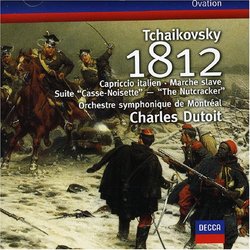| All Artists: Pyotr Il'yich Tchaikovsky, Charles Dutoit, Montréal Symphony Orchestra, Orchestre Symphonique De Montreal Title: Tchaikovsky: 1812 Overture; Capriccio italien; Marche slave; etc. Members Wishing: 0 Total Copies: 0 Label: Decca Import Original Release Date: 1/1/1999 Re-Release Date: 9/1/1999 Album Type: Import Genres: Special Interest, Classical Styles: Marches, Forms & Genres, Symphonies, Symphonies Number of Discs: 1 SwapaCD Credits: 1 UPC: 028946641927 |
Search - Pyotr Il'yich Tchaikovsky, Charles Dutoit, Montréal Symphony Orchestra :: Tchaikovsky: 1812 Overture; Capriccio italien; Marche slave; etc.
 | Pyotr Il'yich Tchaikovsky, Charles Dutoit, Montréal Symphony Orchestra Tchaikovsky: 1812 Overture; Capriccio italien; Marche slave; etc. Genres: Special Interest, Classical
|
Larger Image |
CD Details |
CD ReviewsTchaikovsky shows his populist side with "1812 Overture...." Alex Diaz-Granados | Miami, FL United States | 02/20/2004 (5 out of 5 stars) "Although it is hard to believe in this age of fragmented musical genres dominated by Britney and Eminem, what we now call "classical" music -- a term that evokes images of wealthy, elegantly dressed audiences and snooty announcers -- was, in its heyday, a "people's" genre. Concerts by Mozart, Beethoven, Chopin and other composers/performers were "hot ticket" events, and operas by Verdi, Puccini, and Wagner were written not only for rich patrons and royalty, but were also meant to entertain the "masses." Indeed, many classical music pieces (Beethoven's Third Symphony -- Eroica -- and Mozart's German-language operas) were composed not only to entertain but to instill a sense of nationalism or patriotism.Peter I. Tchaikovsky not only composed serious works (Symphony No. 6 in B minor Op. 74 "Pathetique"), he also wrote many crowd-pleasing compositions that, even 111 years after his death in St. Petersburg, are still listened to by large and diverse groups of listeners all over the world. Some, like the "Nutcracker Suite" (Op. 71a) are arrangements from larger works such as a ballet, while others, including the famous 1812 Overture (Op. 49) and "Marche slave" (Op. 31), were written to celebrate both Russian nationalism and the Pan-Slavic movement of the late 1800s and early part of the 20th Century.Although only two of the works on this recording (performed with energetic brilliance by the Montreal Symphony Orchestra under the baton of conductor Charles Dutoit) fall into the category of "propaganda music for the 'Rodina' (Motherland)," three of the four (1812 Overture, Marche slave or "Slavic March," and Capriccio Italien [Op. 45]) compositions have some martial overtones. Of course, the most obviously nationalistic is the 1812 Overture, a brash, noisy, and purposely inelegant (yet wildly popular) ode to Russia's victory against Napoleon's Grand Army and the French retreat from Moscow.Known nowadays perhaps as "the piece with the artillery" (giving, perhaps, new meaning to the words "heavy metal") played across the United States on Independence Day, the 1812 Overture, for all its "plain Ivan" approach, is nevertheless a clever mix of Russian Orthodox Church hymns, cavalry marches, and not one but two national anthems ("The Marsellaise" and the Russian Czarist anthem "God Save the Czar"). In addition to a full symphony orchestra and field artillery, Tchaikovsky uses church bells to punctuate a glorious and celebratory climax that ends aptly with an interpolation of "God Save the Tsar" and the "cavalry fanfare."Although for many of us now living in the early 21st Century the wars in Yugoslavia were the first hint that there was a bond between the Russians and the Serbs, the reality is that there has always been a sense of Pan Slavism in Russia, which looks at the Serbs and Montenegrins as their little brothers. Historically, Moscow had always wanted to become the "big honcho" in the Balkans, not only for strategic purposes (the Dardanelles and access to the Mediterranean have always been a Russian priority) but for religious reasons as well. So when Russians went to Serbia and Montenegro to do battle against the Ottoman Empire, Tchaikovsky composed the Marche slave (Slavic March) as a fundraiser. It too uses traditional Slav music and rhythms, including the Mother of All Slavic Themes, "God Save the Czar."Capriccio Italien has always been one of my favorite pieces, perhaps because I like martial music (blame John Williams and his movie marches!), and the Capriccio begins with a beautiful variation of an Italian cavalry trumpet call that the composer heard from his hotel room every night during his Italian sojourn in the winter of 1879-80. Here, too, Tchaikovsky mixes various local songs and melodies to paint a musical portrait of Italy, although he does it with more flair and elegance than in the 1812 Overture. Dutoit and the Montreal Symphony perform this bright and breezy piece with gusto and brilliance, particularly in the brass section, which is really prominent.Although I have never seen any version of Tchaikovsky's ballet The Nutcracker, I am fond of the whimsical Suite from the larger (and supposedly uneven) work. The tone of the music here, obviously, is light and fanciful, and the orchestra does a splendid rendition of the various themes and waltzes from this Christmas-related favorite."
|

 Track Listings (14) - Disc #1
Track Listings (14) - Disc #1